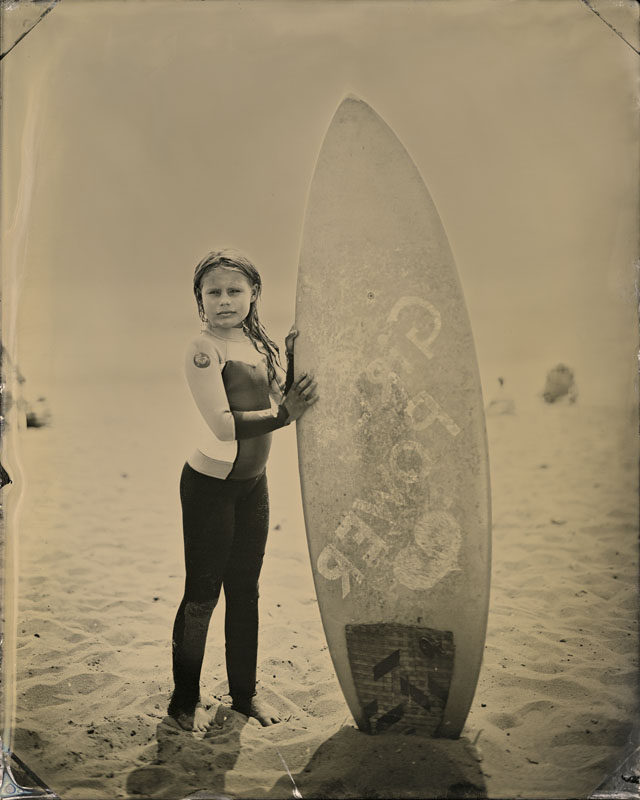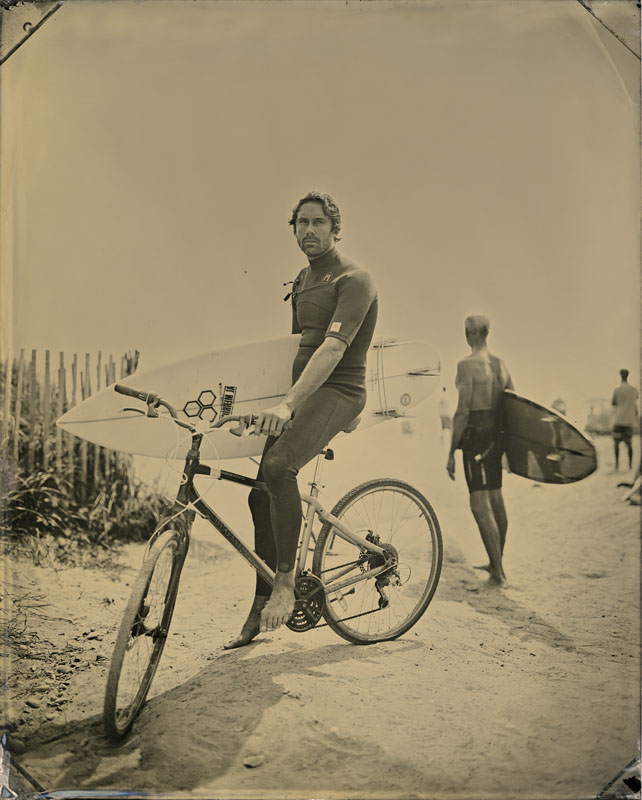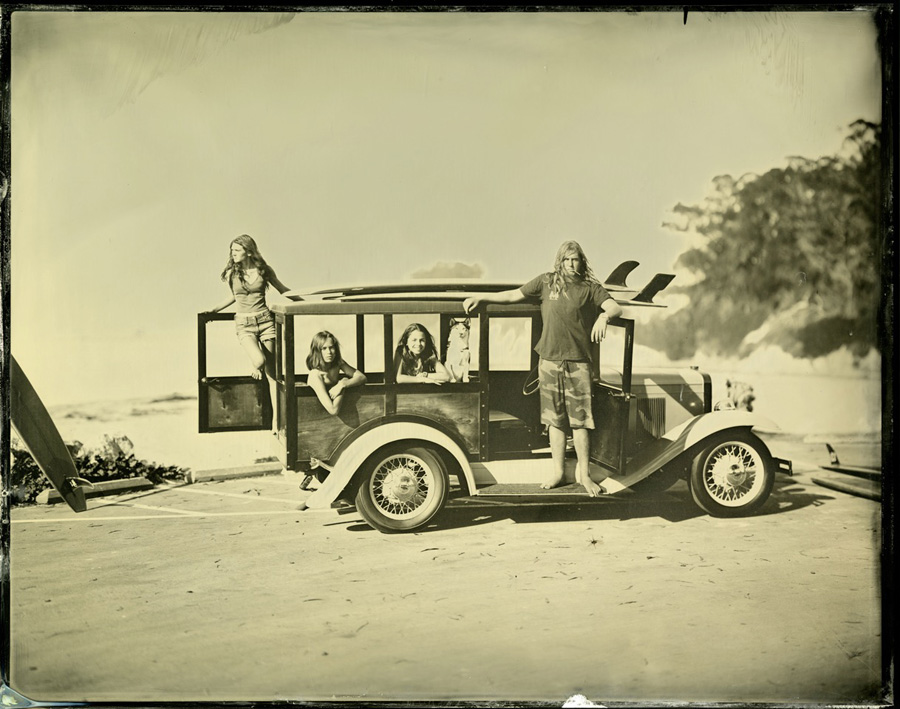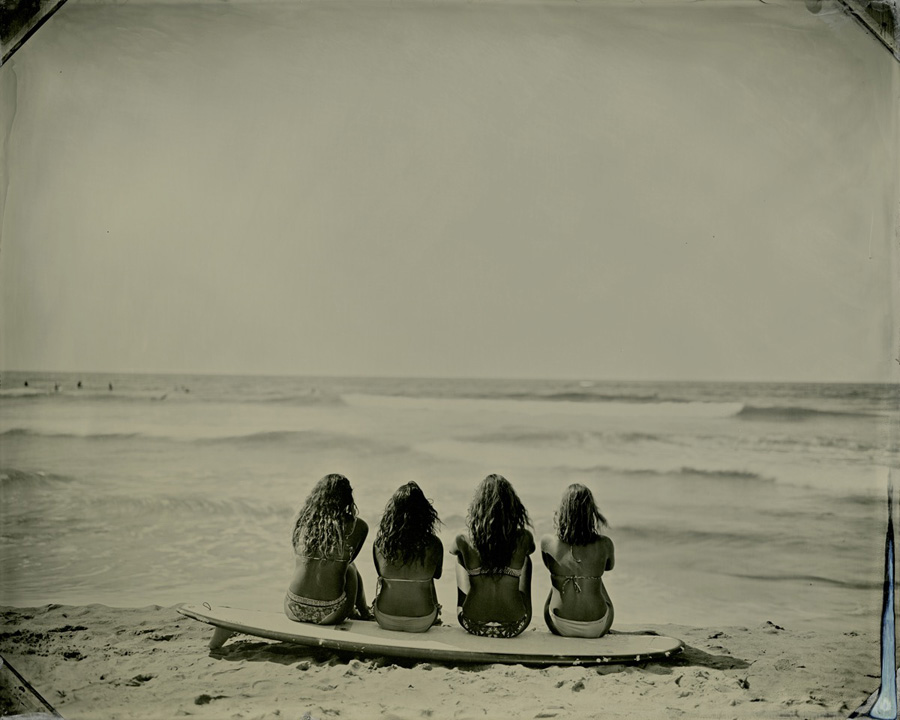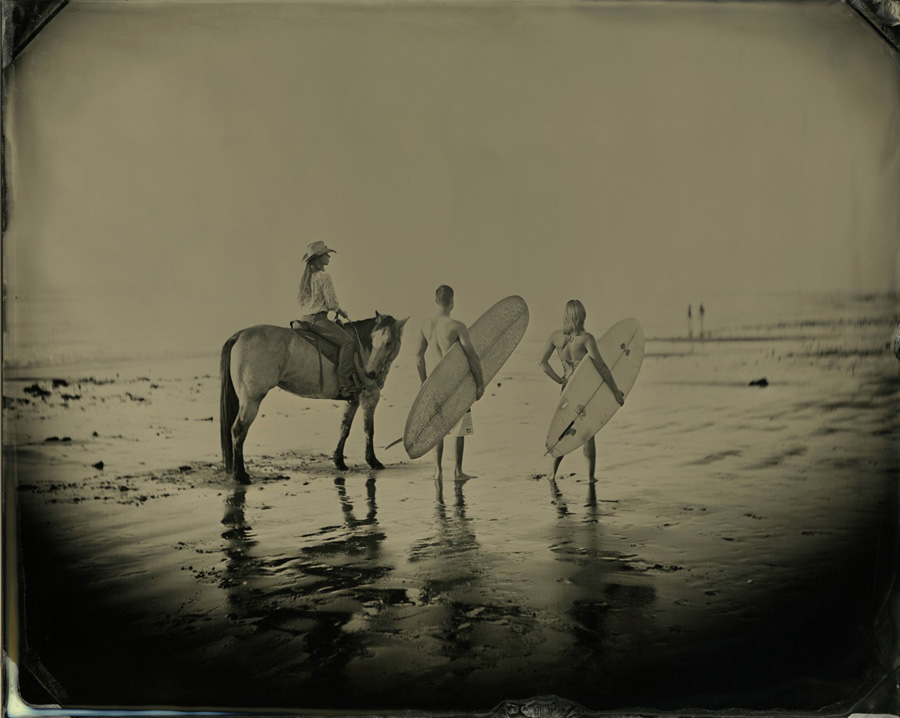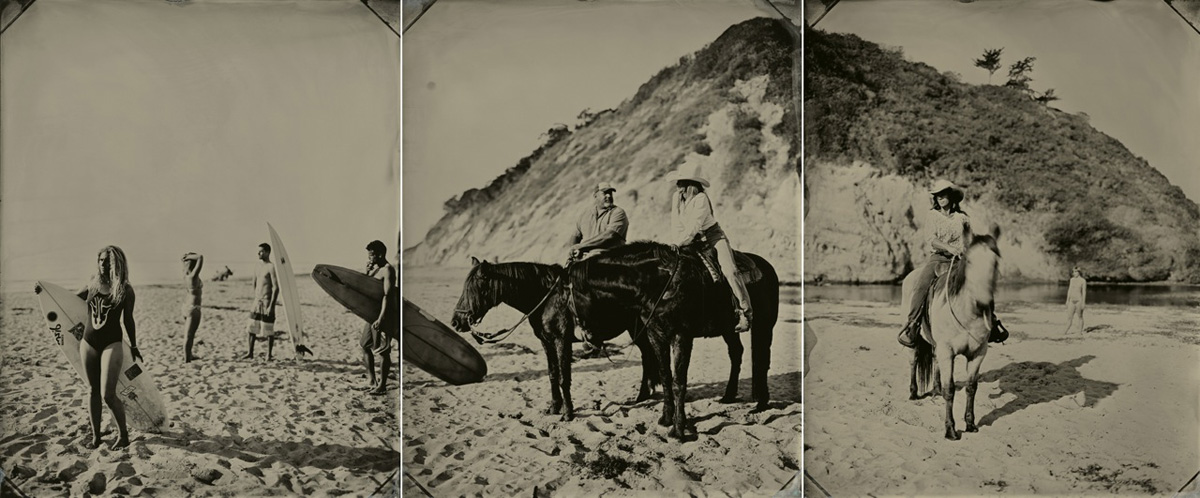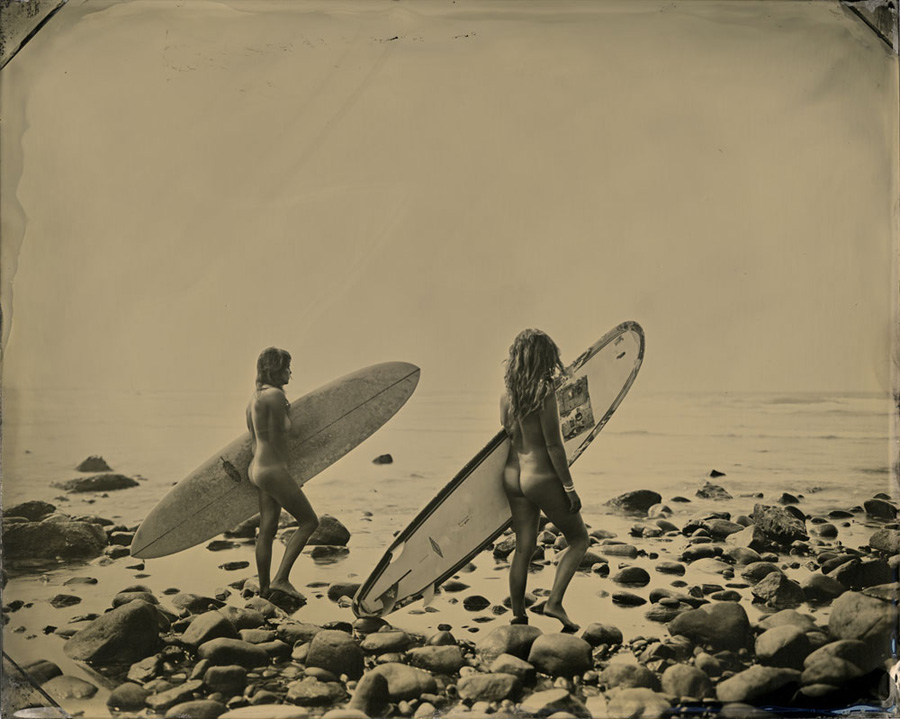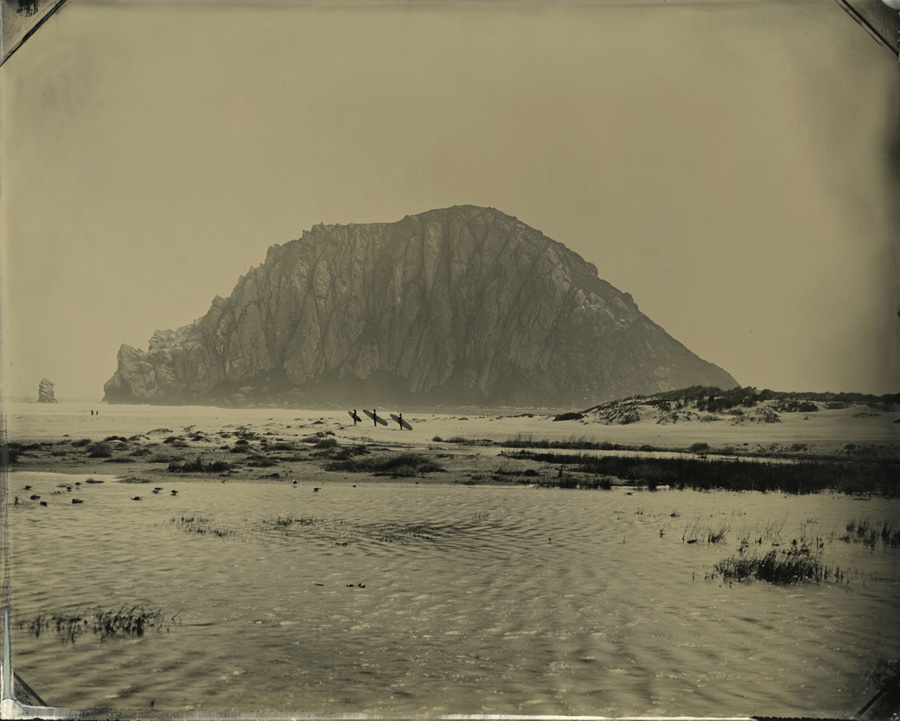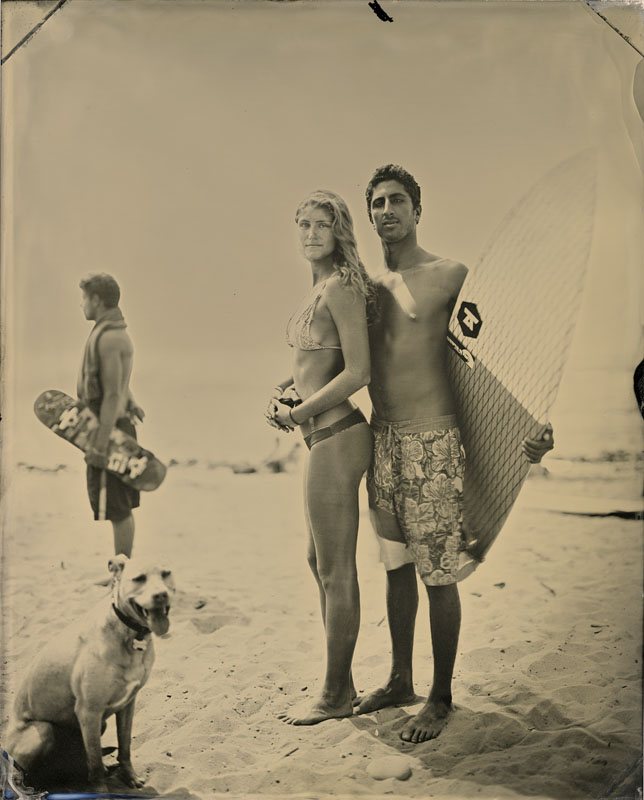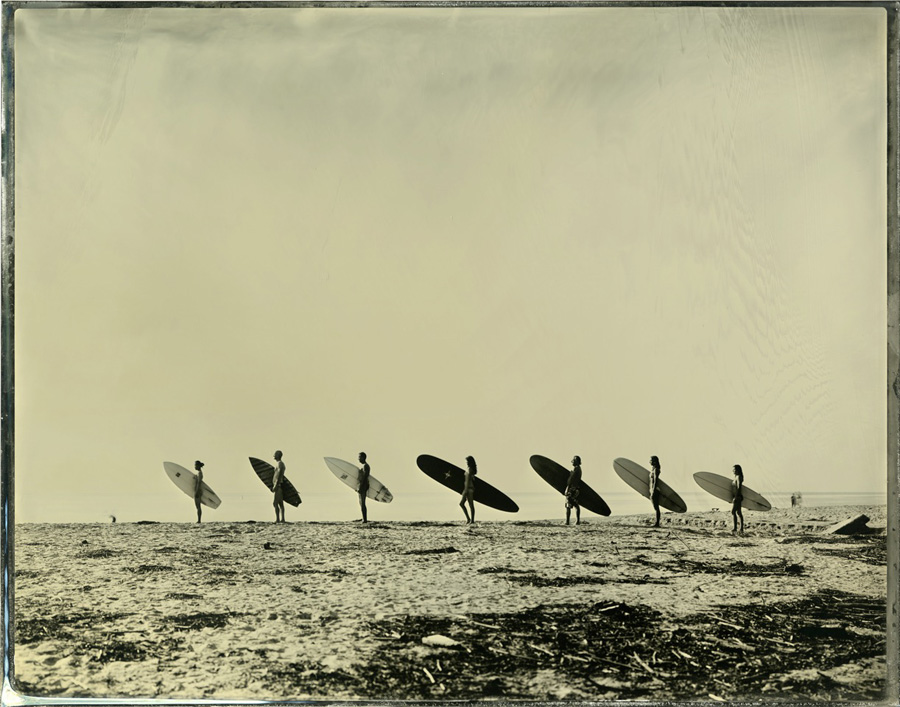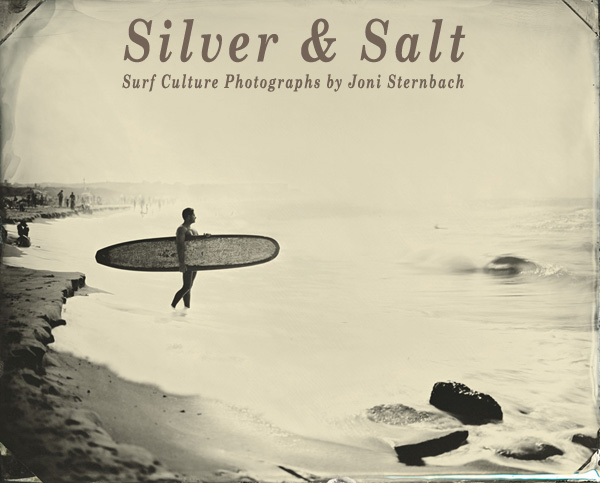
Soulcatcher Studio is proud to present Silver & Salt: Surf Culture Photographs by Joni Sternbach. This exhibition features many new images, being shown to the public for the first time. This work is part of a long-term project that began in 2006, making contemporary portraits of surfers created using the historic wet-plate collodion process. An 8×10″ or 11×14″ aluminum plate is hand-coated and sensitized in a bath of silver nitrate just before being loaded in the artist’s 19th-century-style, wooden view camera. Sternbach uses a variety of antique brass and modern lenses. The entire process is done on location, with a portable darkroom. This very labor-intensive process has changed little since its invention in the 1850s. The photographs are a unique blending of subject matter and photographic technique. Part craft and part theatre, the instantaneous wet-plate collodion process allows Sternbach to create one-of-a-kind tintypes that are imbued with a feeling of ambiguity, timelessness and mystery.
Sternbach has circled the globe capturing her unique images of surf culture, visiting beaches on both coasts of the United States, as well as Australia, England and France to continue the series. Sternbach’s latest monograph, Surf Site Tin Type (Damiani Editore, 2015), is a chronicle and celebration of these fascinating denizens of regional surf spots around the world.
In the foreword to Sternbach’s first book, SurfLand (Photolucida, 2009), Phillip Prodger writes: “(Sternbach’s photographs) are about relationships – the relationship between surfer and board, between human and landscape, between photographer and subject, and between the surfers themselves. The dynamics of families and friends are revealed in subtle gestures and expressions. Couples are conspicuous in their affection, or occasionally, by their lack of togetherness. Mothers with daughters, and fathers with sons, speak of time’s passing. Sternbach captures the spirit of community that unites surfers, but also the differences that make each surfer distinct.”
Sternbach shared this about her process: “I recently read Rebecca Solnit’s book entitled A Field Guide To Getting Lost. In her book, Solnit states, “That thing, the nature of which is totally unknown to you is what you need to find, and finding it is a matter of getting lost.” I loved the differences between the idea of being lost and getting lost. My own work relies on a similar premise, of losing oneself to the moment, to chance and spontaneity. My picture taking exists in a place where time is slowed down. My methods are deliberate, antiquated, out of date. I don’t compete with the speed of the digital world. In return, it affords me time; time to engage and interact with my subject and the world in a surprising way. Placing myself in unknown situations and different environments has been a cornerstone of my photographic practice for the last ten years. Often I am smack dab in the public eye, meeting a variety of people. One by one, I slowly begin to take their picture. When I ask people to pose, I typically make only one photograph. They often watch me process the picture on location in my portable darkbox and we all share in the magic moment as it emerges from the fixer, a rabbit out of the sorcerers hat.”
Sternbach’s work is exhibited both nationally and internationally and held in many prominent private and public collections, including the Smithsonian National Museum of American History (Washington, D.C.), Bibliotheque Nationale (Paris, France), Museum of Fine Arts (Houston, TX) and the International Center of Photography (New York, NY). Her work has also been featured in publications around the world.
Signed copies of the limited edition presentation of her monograph SurfLand (which includes a signed and numbered, limited edition pigment print photograph) are available in our bookstore (scroll down to the Limited Edition section).
The Process: Sternbach uses the historic and instantaneous wet-plate collodion process (which dates back to the 1850s) to create one-of-a-kind tintype photographic plates. An 8×10″ or 11×14″ aluminum plate is hand-coated and sensitized in a bath of silver nitrate just before being loaded in the artist’s 19th-century-style, wooden view camera. Sternbach uses a variety of antique brass and modern lenses. The entire process is done on location, with a portable darkroom. The tonal variations in the finished images reflect their hand-made character; the corners rubbed where they were held in the camera. The original, finished plates are later scanned to create these archival pigment print photographs.
Print Information: All archival pigment print photographs are produced under the artist’s direct supervision. Prints are signed, numbered, titled and dated (with the print date) by the artist in pencil au verso. Each image is offered in two image sizes/editions*, as follows:
8×10″ image printed on 8.5×11″ paper (in a limited edition of fifteen numbered prints, plus two Artist Proofs). Prices start at $550.00 and increase as the edition sells out.
18.5×23″ image printed on 20×24″ paper (in a limited edition of eight numbered prints, plus two Artist Proofs). Prices start at $1,900.00 and increase as the edition sells out.
*Triptychs are available in one print size: Approx. 9.5″x23″ image printed on 20×24″ paper (in a limited edition of 8 numbered prints, plus two Artist Proofs). Prices start at $1,900.00 and increase as the edition sells out.
Print prices are set by the artist and are subject to change without prior notice. Please contact Soulcatcher Studio for current pricing information.
Please inquire if you have other favorite images by this artist, as we can offer her entire portfolio of work for sale.
We hope you enjoy this exhibition and sale of timelessly beautiful fine art photographs.
Click on the thumbnail images below to view enlarged examples and detailed print information.
Click on each enlarged image to advance to the next image in the exhibition.
